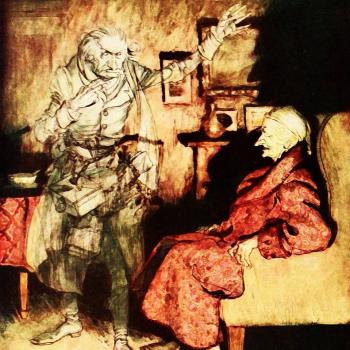This semester I'm teaching a course titled "Philosophy of the Ordinary." The title is difficult to explain. It is as much the result of having to give something to the secretary before the deadline as it is of careful thought. For a while I worried that it would mislead students, or worse, be incomprehensible to them. But any title I would have come up with would probably have been equally misleading. So I made fliers and posted them around campus as well as on my door, hoping that would dispel some misunderstanding. I doubt that it did, but enough students showed up to make a good class. Perhaps the mystery of the title attracted them.
The point of the course is at least two-fold: to help them see supposedly ordinary things anew, as things in their own right, as things to be appreciated and savored; and to help them to understand supposedly ordinary life and work as valuable in their own right, as something to be enjoyed as giving meaning to life. We've read Martin Heidegger, Charles S. Inouye, Wendell Berry, Blake Hurst, Iris Murdoch, and Matthew B. Crawford; we will read Albert Borgmann, Margaret Kim Peterson, and Cynthia Ozick. All of them help us think about both sides of ordinariness, things and life.
When it comes to ordinary things, it is difficult even to see them, precisely because they are ordinary. They disappear among all the other ordinary things. Instead, what is extra-ordinary draws our attention. It calls to us and we seek it: strong passions like first love; spiritual highs indistinguishable from emotional ones; awe-inspiring sights culled from travel; exotic things, tastes, and smells now available to every middle-class consumer. If we wonder (the beginning of philosophy, Aristotle says), it is usually at the extraordinary. That fact is itself extraordinary, for why wonder about the exceptional rather than what is always everywhere with us? The answer is "Because it is always everywhere with us and, so, unnoticed."
As I said, that is the most obvious thing about the ordinary thing, its unobtrusiveness. It hides within its ordinariness. The computer on which I type rarely shows up in my purview as the individual thing that it is. Indeed, except in those times when it will not do what I expect it to, it shows up only as one of many possible computers, a stand-in, a place-holder in the order of things. The word ordinary suggests this aspect of things: they are ordinarius, ranged in regular order, so much so that they disappear and what I really encounter is the order of which they are part. I encounter the order in which the ordinary object is a placeholder for any similar object that could occupy its place.
We should be glad that ordinary things are unobtrusive. Were it not for their invisibility, we would be mad. Life requires that I be able to reach for things and use them without stopping to consider what they are in themselves. I reach for a shirt in my closet in the morning and pull it on without having to think about doing so. Indeed, I am usually thinking about other things, perhaps carrying on a conversation with Janice, perhaps thinking about how best to get discussions going in my first class of the day. I open the door of my office without having to ask myself what it is. Because it is ordinary, something that requires no reflection at all, I can simply take hold of the knob and open it to enter the office as I read my mail. If I encountered each object in my existence as a discreet, unique object in its unique particularity, and only after that encounter dealt with it as something generic, I would be submerged in chaos, unable to think or decide or act. In its ordinariness, the ordinary is a gift.
The danger of this gift is that it may tempt me to misunderstand myself. As the entities around me disappear in the ordinary, the substantiality of the world is likely to fade. The places become the real, and the entities occupying those places turn into nothing more than shades passing in and out of their places. In that case, only the order will appear to remain, and I can be tempted to believe, at least implicitly, that I am the center of that order. The order in which I find myself belongs to me, and I become one of those who believe that the only real order is the order of the mind, my will, even though I may never say that to myself.





